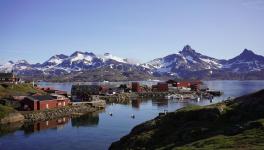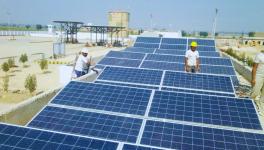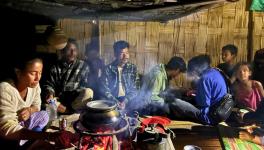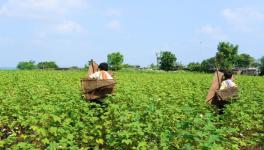Can the Winter Olympics Survive the Climate Crisis?
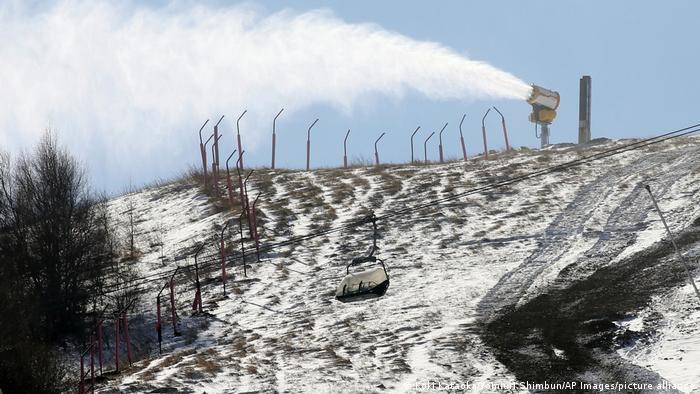
Snow machines are working overtime at Beijing skiing venues with no natural snow
The downhill skiing and snowboarding portions of the Winter Olympic Games begin on February 4 at mountains near Beijing that traditionally have very little snow — a problem that also beset the 2014 games in subtropical Sochi in Russia.
The usually barren mountainsides in Yanqing and Zhangjiakou where the skiing events are held will rely for the first time on 100% artificial snow.
The cannons used to produce the snow are not only energy-intensive, but are fed with water from over 30 kilometers (about 19 miles) away, notes Carmen de Jong, professor of hydrology at the University of Strasbourg who has researched environmental impacts of the Beijing games.
But snow-making isn't the only reason De Jong calls this year's Winter Olympics "the most unsustainable games of all time." She too describes the heavy erosion caused by tree-felling to create ski runs in nature reserves, despite a large tree replanting effort; and the fact that villages and infrastructure such as roads and parking lots were mostly "constructed from scratch" using near 10 million tonnes of CO2, a "conservative estimate," she says.
The Beijing Organizing Committee (BOC) have promised alow carbon event run, when possible, on renewable energy. But while wind turbines and solar farms have been built at the sites, de Jong says there is a strong reliance on carbon offsets to square the emissions ledger.
Meanwhile, the "energy-intensive" pumping of water uphill to make snow in the arid region has not been included in the climate neutrality calculations, she says.
Ultimately, the "problem is that the climate in Beijing is not appropriate for snow-making," according to de Jong. The high winds that blow up dust in the dry region, and which settles on the snow, means that double the artificial snow is required than would be produced in European Alps.
"So the snow guns are running for longer than usual [and] they have to use a lot more water that is used on average in the Alps," said de Jong.
This problem is being exacerbated as the games move to dry, water- and snow-scarce Asian locations, with most potential European or North American venues no longer bidding for the games due to cost and environmental impacts.
Global heating threatens future of winter games
Beijing's reliance on artificial snow is not new, with the 2014 Sochi and 2018 Pyeongchang games needing 80 and 90% of machine-made snow cover respectively. Meanwhile, at the 2010 Vancouver winter Olympics, helicopters were also used to ship in snow from high altitudes as it was too warm to make fake snow.
Even if the snow-making machines are to be run on renewable energy, a new study shows that failure to dramatically reduce global greenhouse gas emissions may mean only one of the 21 previous Winter Olympics host cities can provide "fair and safe conditions" for the games by 2100.
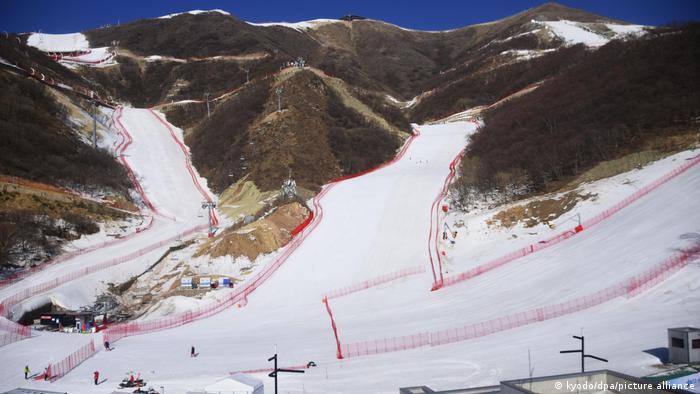
Bare mountainsides contrast with snow runs created wholly by machines for the Beijing skiing events
By contrast, if the Paris Climate Agreement emission targets are met, the number of climate-reliable host cities rises to eight.
The study uniquely combines climate modeling with responses from athletes on the safety of skiing in a warmer environment. Even within 30 years, current heating trends mean the number of viable Winter Olympics locations will quickly diminish.
"If we go down the high emission pathway, by mid-century we are left with four that are climate reliable," said Daniel Scott, a professor of geography and environmental management at the University of Waterloo and lead author of the study. Sapporo, Japan, would be the only viable location by century's end.
"Solchi made no sense climatologically," said Scott of the 2014 games that were already not climate reliable. But global heating will make many once reliable venues untenable. Many ski athletes "have real concern about the future of their sport," he said.
Systemic change needed to future-proof games
But making Olympic venues more climate friendly won't alone fix the problem.
"Focusing on the games' impact and lightening the carbon load of one mega-event every two years alone isn't going to slow global warming," said Sören Ronge, coordinator of Protect Our Winters Europe, a climate advocacy group based in Innsbruck, Austria.
POW wants to see the International Olympic Committee, along with diverse winter sports stakeholders and enthusiasts, "come together to play a vital role in pushing governments to enact systemic changes to the way that we source, distribute, and consume energy," said Ronge.
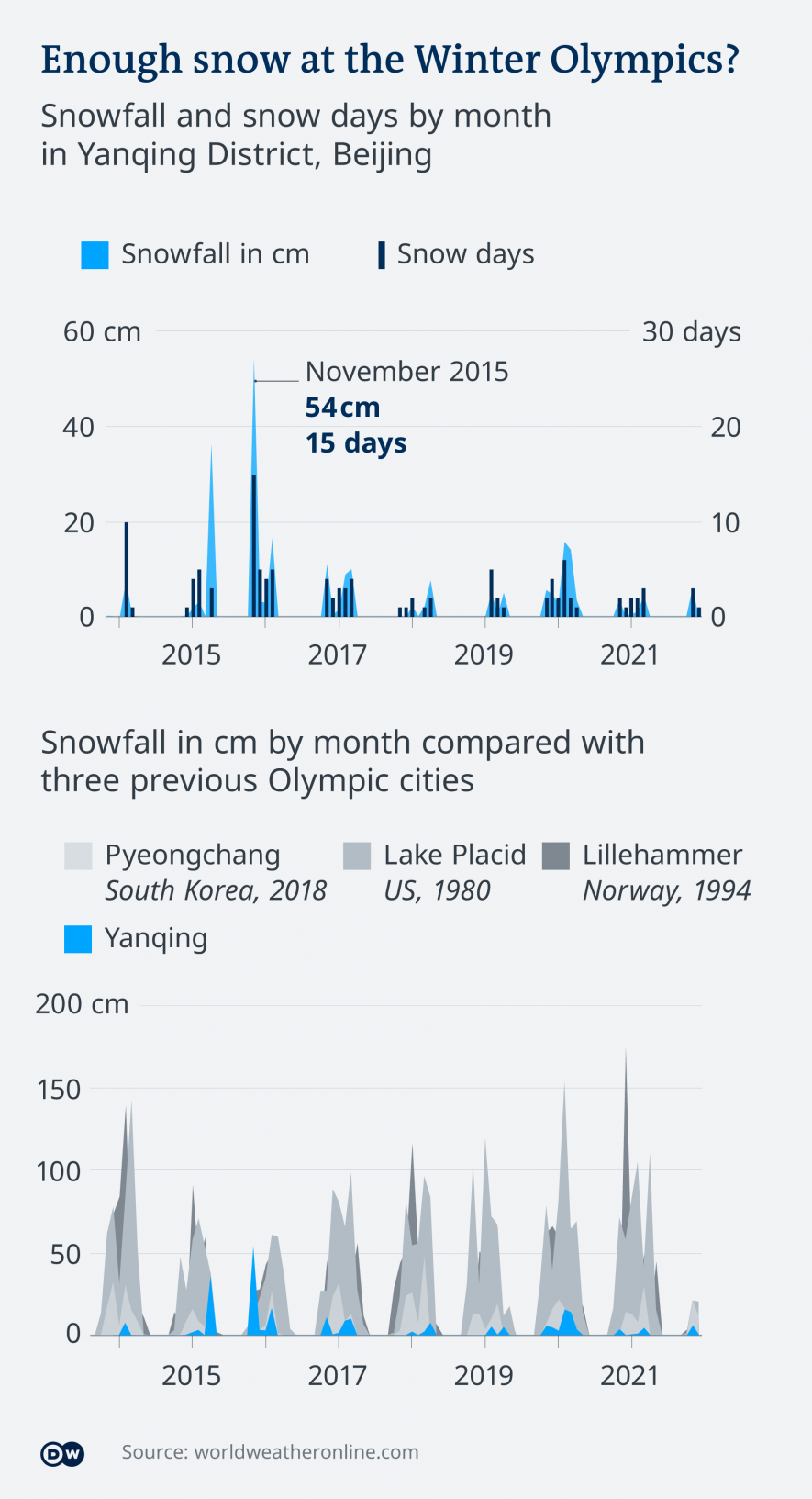
US skier River Radamus, who is competing in Beijing and is a three-time Youth Olympic Games gold medalist, is outspoken on the impact of climate change on his sport and has donated funds to POW.
"As a collective we can start to push the large manufacturers and corporations, and that's the way that we really effect change," said the 23-year-old, who describes 60 degrees Fahrenheit (15.5 degrees Celsius) temperatures at races in Europe this season that posed challenges for the International Ski Federation that manages the events. "They couldn't pull off a race because it was too warm in the middle of winter," said Radamus.
"The science is more than clear," Ronge told DW. "We need to reduce emissions immediately if we want to save winter sports and see future Olympic winter games."
Retired world champion downhill skier Felix Neureuther, who comes from the southern Germany city of Munich, has also been outspoken on the environmental impact of winter sports, criticizing the practice of training on glaciers in mid-summer; and the cutting of forests to create downhill slopes.
"The Olympic Games clearly have to become more sustainable, otherwise they will die out," he said in October while releasing a documentary on the impact of global heating in the European Alps.
Stay local, act globally
According to Daniel Scott, the International Olympic Committee and ski competition organizers need to localize training and schedule consecutive events in the same regions to minimize travel — which for Neureuther, means to stop training on glaciers on the other side of the world.
Scott says that while athletes who have devoted their lives to the sport "feel forced to compete," they see "contradictions" in the amount of carbon-intensive travel they have to perform both to compete, and to train for 12 months of the year.

River Radamus is one of many young skiers who fear for the future of their sport
According to River Radamus, one advantage of the pandemic has been that the US Olympic team was forced to stay at home to train.
"It's helped us a bit more resourceful and not as wasteful in our training process," he said, adding that in previous years he has traveled abroad to Chile or New Zealand. "[It's] a small step, but you know a bunch of small steps can make a big difference," he said of being more "climate frugal."
But for Soren Ronge of POW, individual effort will not be enough without systemic climate mitigation.
"If no drastic measures are taken to reduce emissions and bring us on path to a 1.5 – 2 degrees Celsius climate scenario, not only the future of Winter Olympics, but the future of winter sports in general is at risk," he said.
Daniel Scott agrees that staying close to the Paris targets will be vital if the industry to survive. "When we get into that realm of a plus three or four degree world, all bets are off."
Additional reporting by: Sam Baker
Edited by: Tamsin Walker
Get the latest reports & analysis with people's perspective on Protests, movements & deep analytical videos, discussions of the current affairs in your Telegram app. Subscribe to NewsClick's Telegram channel & get Real-Time updates on stories, as they get published on our website.









